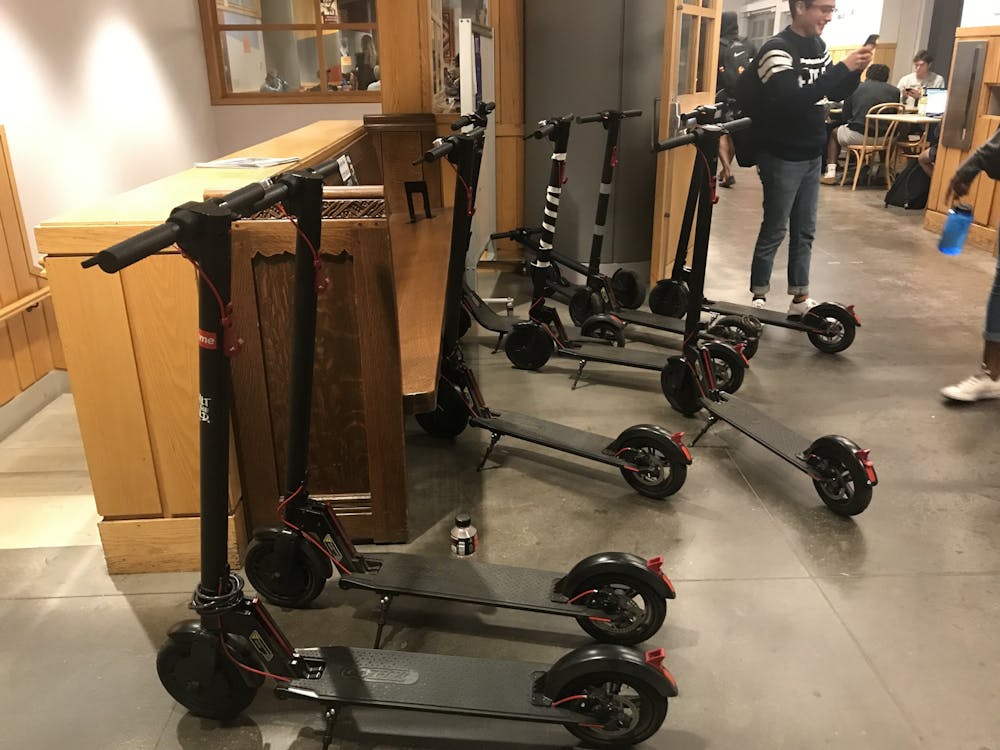In recent weeks, signs reading “NO SCOOTERS OR BICYCLES INSIDE THE BUILDING” have been plastered on the doors of campus buildings, such as Fine Hall, Robertson Hall, Jadwin Gymnasium, and the Julis Romo Rabinowitz Building and Louis A. Simpson International Building.
Electric scooters — industrial, larger versions of the traditional two-wheelers — have risen in popularity as a fast and convenient way to zip around campus. While scooters represent a slight increase in convenience for some, they can cause major obstacles for others.
Parked scooters can make it difficult for students with physical disabilities to access necessary passages and create general safety hazards when they impede exits and entryways.
Naomi Hess ’22, who makes her way around campus using her electric wheelchair, said that the presence of electric scooters inside buildings has affected her ability to navigate.
Hess is a staff writer at The Daily Princetonian.

Signs taped to doors of Robertson Hall warn against bringing scooters into building.
Photo Credit: Uchechi Ihenacho / The Daily Princetonian
“In the past month, there have been two incidents where I’m on the A-level of Frist outside late meal, and I’ve wanted to get on the elevator to get to another level of Frist, but there were so many scooters parked by the staircase that it was blocking the pathway to the elevator. I had to wait until someone noticed me struggling, and he moved the scooters,” said Hess. She said electric scooters have blocked her ability to reach the handicap automatic door buttons.
“There are even more troublesome experiences,” Hess added. “When I was trying to take the elevator in [Wilcox Hall] … scooters were literally right in front of the elevator. There were probably three or four, and I couldn’t get to the button — I couldn’t get to the elevator door. Someone came and moved a couple of the scooters for me, but if there hadn't been anyone around, I would have been literally stuck.”

Though the signs on doorways are meant to combat this issue, they provide no context or explanation for the warning. Students — riders and pedestrians alike — interviewed by The Daily Princetonian did not know why the signs had been posted.
“I think it’s pretty stupid,” said Fahd Nasser ’22, regarding the emergence of the signs. A sophomore on the men’s cross country team, Nasser sees his electric scooter as a way to save energy that he can exert at practice instead.
“One thing about scooters on campus, especially for student athletes, is that we can get to our locations much quicker, and we don't have to pedal excessively up and down Elm Drive or across different levels on campus,” Nasser explained.
Nasser expressed frustration at the expectation for students to leave their scooters outdoors, where they may be damaged by snow or stolen.

“It would be stupid to just say that you’re not allowed to bring them into the building …. It can get stolen easily, which is unfortunate,” said Nasser. “You can’t have it outside because there’s inclement weather like snow, and are you expecting kids to have their scooters stop working? I just think that if the person is with their scooter, and it’s not in someone’s way, it should be alright.”
Auset Taylor ’21, who does not own a scooter, expressed similar concerns that leaving scooters outdoors could lead to property damage.
“I think that it’s interesting that they are not allowing them in buildings anymore, because they are expensive, and I don't know if I would be comfortable keeping an $800 bike or scooter when there aren’t really any scooter locks,” she said.
Sonia Gu ’22 echoed these opinions. “It's not that annoying to most people … but also I think people should have more common courtesy.”
All three students were surprised to learn of the impediment that electric scooters can create for students with disabilities and recommended creating a more robust plan for handling scooters on campus.
“It’s an ADA [Americans with Disabilities Act] violation essentially. There definitely needs to be an infrastructure in place so that they are not impeding people who have disabilities and need access to certain points in the building,” said Taylor.
“I think rather than banning it, they should make designated scooter areas, in and outside building areas,” suggested Nasser. “We have to recognize the problem and try to work around it.”
Additionally, Hess and Nasser both stated that a campus-wide email informing students on the scooter policy and the reasons behind it would be helpful.
According to Transportation and Parking Services (TPS), as of now, electric scooters and bicycles are not allowed inside buildings. They could not, however, provide access to a formalized “scooter policy” because one does not officially exist. The TPS website does not include any information on electric scooters.
In an email to the ‘Prince,’ deputy University spokesperson Michael Hotchkiss wrote that currently, a team of campus partners is considering how best to accommodate not only scooter riders, but also pedestrians, cyclists, skateboarders, and bus riders. The team plans to invite input on the issue at the next meeting of the Council of the Princeton University Community on Monday, Dec. 9.
The grouping of “bikes and scooters” on the signs suggests that the electric scooter policy could be crafted in relation to the University’s bicycle policy. The Biking Resources page states that bikes canot block wheelchair ramps or be “placed in a hallway, or allowed to impede a means of egress,” and that bikes that do not heed these rules are subject to confiscation and a fine.
When an official policy comes into effect, Hess hopes to see the issues she has encountered addressed. “I think if we address it now before it gets even worse, then we can make some changes on campus,” she said.








